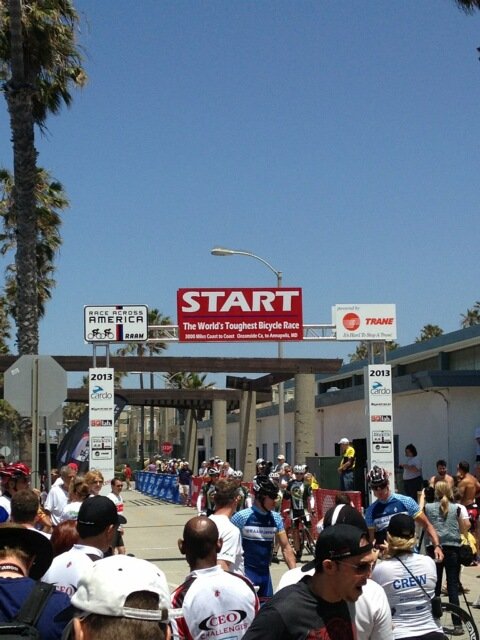
Morgan Hill
Shawn Warthen was taking a breather in a support car, just beginning for his next shift in what was planned to be a grueling six-day cross country ride as part of Race Across America.
He was 50-some-odd hours in to the ride, having ridden out of California, through the Arizona Desert, through Utah and was now descending into Colorado when that race came to a crashing end.
He had five minutes before his turn to tackle a leg in the 3,000-mile journey and was strapping on his helmet and making sure everything was ready for a quick change in riders.
That’s when he heard a scream.
It came from the wife of Jay Ward, the rider nearing the end of his shift.
“I just started gathering myself together, when I heard his wife — who was driving the support vehicle that I was in — start screaming, ‘Oh my God! Oh my God!’” Warthen said.
Warthen looked up and to his horror, saw Ward’s bike enter into a speed wobble — a force that causes the bike to shake violently at high speeds that can be caused by any number of factors.
Ward was traveling down the Rockies at speeds approaching 50 miles per hour as the team attempted to enter Durango, Colo.
Warthen watched helplessly as his teammate and new friend struggled in vain to correct the problem. Ward’s attempt to use a culvert to slow his decent failed and he tumbled into a rocky patch on the side of the road.
Ward was not seriously hurt, but his bike was in no shape to safely ride and Warthen said he was injured to the point where he needed to stop.
That’s when Warthen made the difficult decision: He gathered his other two teammates — who were on an 8-hour break from their ride while Ward and Warthen took their shifts — and said the race would come to an end.
After two days, seven hours and 17 minutes, covering 858.7 miles — according to RAAM’s official checkpoint times — their journey was over.
Warthen said they weren’t sure what caused the bike to enter the speed wobble, that it could have been any number of factors from unbalanced weight, improperly installing the front tire to just going too fast for the bike.
“Jay’s bike was compromised,” Warthen said. “At they point, it needed to be looked over by a mechanic, possibly even X-rayed.”
Ward’s crash capped what had been an odd week that started with Warthen’s original fourth rider needed to drop out because he broke his foot playing soccer. In an attempt to keep the ride alive, Warthen reached out to biking clubs, bike shops and companies, but to no avail.
Finally, a friend of his recommended he reach out to Ward and the two hit it off.
Race Across America is designed to be a test of endurance and will. It tasks riders to go from Oceanside to New Jersey on a bike with little to no rest in teams of two to eight in just six days. It is all for charity as the riders raise money for a cause of their choice.
Warthen and his team were raising money for Real Opportunities for Kids, a San Francisco charity that gives scholarships to kids from difficult backgrounds.
Their goal was $80,000, which they would have raised if they finished the race. But for making it as far as Colorado, they still raised $30,000, Warthen said.
He said the decision to not finish was hard, because there had been so much training and money that led up to making the cross country attempt.
“It was a huge endeavor just to star let alone finish,” Warthen said.
The experience was harrowing just in the two days he was on the road.
The ride takes the most direct route for a bicycle, which is often through random roads that really beats up a car.
On top of that, it’s done in June when the Southwest deserts regularly top 100 degrees.
The intensity of the ride is what really Warthen.
Peddling in the middle of the night, with nothing but the headlights of the support cars lighting his way, he began to succumb to sleep deprivation.
“I think collectively, we had eight or nine hours of sleep,” Warthen said. “I know I didn’t sleep a wink.”
The riders went in shift where two would be on the road alternating every half hour while the other two rested for eight-hour stretches.
But Warthen said in reality, the two on their break are being driven to the next trade off spot, taking care of gear and there’s little time to actually sleep.
He recalls having auditory and visual hallucinations. He’d regularly hear his name being called or a bull racing beside him on the side of the road.
“I got back in the car and the crew would listen to music to keep them alert, but I asked them to turn it off because I kept hearing my name being called,” Warthen said.
He did get some rest — including a shower – in a little town of Mexican Hat, Utah on the way from Monument Valley to Durango, Colo.
Despite the physical and mental exhaustion, Warthen said when he was on the bike riding, all of that went away.
He said his next attempt, he wouldn’t change very much, except that he would treat each leg with more respect. Warthen said he would train the same, because to do more would take too much out of him.
Warthen said he might have a better support vehicle to go with them next time, but he said he didn’t want to get too cumbersome with the amount of people going along.
Exactly when that next trip will happen is up in the air.
“There’s no question I’m going to do it again, if it’s next year or the following year,” Warthen said.














